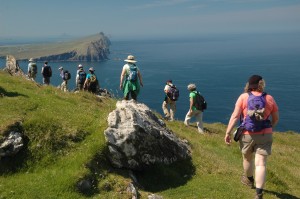
Boomers walking the Irish coast get gorgeous vistas — and health benefits, too. Photo from Walking the World.
Can travel keep you healthier as you grow older?
Yes, says a new white paper by the Global Coalition on Aging (GCOA), commissioned by the U.S. Travel Association, and purporting to show for the first time a series of direct links between travel and increased good health.
While acknowledging that data on these links are somewhat limited, and urging more medical research on the topic, a GCOA survey of various health studies shows that the evidence already out there is compelling.
“Those who stay healthy as they age are able to sustain active lifestyles, including traveling into our 70s, 80s and beyond,” the study notes. “It is becoming increasingly clear, however, that the reverse is also true: as one travels, one will be healthier.”
Start with brain health, which includes warding off dementia and Alzheimer’s.
The GCOA quotes Dr. Paul D. Nussbaum, a clinical neuropsychologist and adjunct professor of neurological surgery at the University of Pittsburgh School of Medicine: “Travel is good medicine. Because it challenges the brain with new and different experiences and environments, it is an important behavior that promotes brain health.”
By helping to build brain resilience at the cellular level, the GCOA notes, activities associated with travel can potentially delay the onset of degenerative disease.
The GCOA cites research showing that regular participation in social and leisure activities, including travel, is associated with a lower risk of subsequent dementia. And a Wisconsin study showed that women who don’t take vacations are twice as likely to suffer from depression as those who do.
And, the GCOA adds, travel also provides vital “intergenerational social connections. It can link multiple generations and those of all ages and in that way also contributes to mental health in healthy aging.”
Heart health is another potential travel beneficiary.
The GCOA cites the seminal Framingham Heart Study, a long-term cardiovascular health survey conducted since 1948 on residents of Framingham, Massachusetts, now in its third generation of subjects. After taking into account other traditional risk factors, the GCOA notes, women who vacationed at least twice a year had a significantly lower risk of developing a heart attack or coronary death compared to women who vacationed every six years or less.
A separate nine-year study showed that men who don’t take an annual vacation have a 20 percent higher risk of death and almost a third greater risk of death from heart disease.
Meanwhile, the same study showed that travel can help reduce everyday stress, which can play a damaging role in health by weakening the immune system and aggravating maladies ranging from headaches to irritable bowel syndrome. The Mayo Clinic has reported that stress can speed up the aging process as well.

Sea kayaking offers both exercise and fun. Photo from Sea Kayaking Adventures
Americans seem to agree. The GCOA notes that more than three-quarters of Americans in one study believe their health improves after a vacation and “roughly 80 percent believe that vacations and activities undertaken on vacations result in greater productivity, energy and focus.”
And, the GCOA reports, more than three fourths of Americans who travel “report satisfaction with their physical health and well-being while only 61 percent of those who do not travel say the same.” (Admittedly, people in poor health may not travel as much for that reason, so the cause-and-effect relationship may be somewhat reversed.)
But the GCOA makes a strong pitch for active travel, noting that nearly two-thirds of survey respondents say they walk more and get more exercise when they travel than when they are at home.
“Physical inactivity,” it contends, “accounts for more than 3 million deaths per year, largely from non-communicable diseases such as coronary heart disease, type 2 diabetes and cancer.” For older adults, the GCOA adds, studies show that the net health benefits of exercise are likely to be greater “if the main focus is on moderate-intensity activities, like those experienced while traveling.”
The time to start traveling for your health, though, is not just in retirement, as many people do. As the GCOA study puts it, “Long-term benefits will only come with a new way of thinking and behaving. To that end, activities that contribute to healthy aging should start well before one turns 60 — or even 50. It requires healthy decisions across the life course, and travel is one of those healthy decisions, much like healthy diet and regular exercise.”
For younger baby boomers, that means keeping an active travel schedule throughout your fifties. For older boomers, it’s never too late to start.
And for travel marketers, it means placing additional emphasis on the health benefits — and not just the pleasures — associated with travel.
Of course, staying healthy is one of life’s great pleasures, so melding the two together should work out just fine.
I’ll have more on the GCOA findings later this week. Meanwhile, you can access the full report here.
Wishing everyone a healthy and happy New Year — and safe travels!
For an in-depth report on the health benefits of exercise — 93 of them, to be exact — check out this great post from healthgrinder.com.
Be sure to download my free report, “How to Ride the Coming Wave of Boomers,” available here. It’s all about the best ways to market travel to baby boomers — the biggest-spending group of travelers the world has ever seen. It’s also the easiest way to subscribe to my blog, so you won’t miss a posting. Thanks!












2 Responses to Good News for Traveling Boomers: Strong Health Benefits